Heard the message to drink 2L of water or more a day? Heard it more than once? You are likely well acquainted with the memo to drink 2L or more of water a day and maybe you currently aim for or achieve this, but have you ever questioned if this ‘more water, more water’ mantra is actually healthful for you?
In this post we are going to first touch on why we need to drink water and the implications of drinking either too little or too much, then we will look at what makes up your water requirements and briefly explore the 5 key factors that influence the amount of water you need to drink in a day. All to reach a conclusion as to if a higher intake of water above meeting the needs of your body does indeed convey additional health benefits.
Why Do I Need to Drink Water?

Water has numerous functions within your body including being the main component of your blood, the solvent through which all nutrients, electrolytes, oxygen and carbon dioxide circulate within your body, the creation of urine to excrete harmful substances from your body, temperature regulation, the production of cerebrospinal fluid and all secretions such as mucus, sweat, tears and breastmilk.
Dehydration and Overhydration

The effects of dehydration can be severe with studies indicating that water loss equal to a 2% loss of body weight causes a decrease in performance and concentration. Further loss of water beyond 3% of body weight is classed as dehydration1 and increases the risk of nausea, vomiting, diarrhea, other gastrointestinal problems, confusion and fatigue and if not rectified can lead to coma and death. On the flip side of this drinking too much water or over-hydration can be dangerous if it is extreme because it dilutes your blood sodium levels (hyponatraemia) which manifests in similar symptoms as that of dehydration including headaches, disorientation, confusion, nausea coma and in extreme cases death.
5 Key Factors Which Influence Your Water Needs
1. Your body size impacts the amount of water you need to drink. The Australian dietary guidelines (ADGs) use body weight as a measure of body size and recommend drinking between 30-35mL of water per kilogram of body weight. As an few examples of what this would look like if you weigh 56kg, 68kg or 93kg it is recommended you have a daily water intake of between 1.6-1.9L, 2.0-2.4L and 2.8-3.2L respectively.

2. The amount of water you need to drink is also impacted by the other liquids you consume over the day. This may seem obvious, yet it is common for people to overlook the amount of fluids other than plain water they drink. Other fluids which contribute to your hydration are tea, coffee, juice, milk, smoothies, sports, energy and soft drinks.

3. The foods you eat contain water the amount of which varies depending on the type of food. Foods which are high in water include fruit and vegetables, jelly, custard and yoghurt. To give you an idea of the water content of some foods a medium apple contains around 80mL water and ½ cup melon has approximately 100mL water, 125mL of jelly or custard contains about 100mL of water and a 200g tub of yoghurt has about 160mL of water. In comparison the water content of some other food such as nuts, seeds and dried fruits is much lower. For example, cashew, walnuts, poppyseeds and pinenuts all contain 0.3mL of water per 10g of nuts/seeds and dried fruits are generally considered to have an average moisture content of 15% which means that if you are eating 100g of sultanas there will only be 15mL of water.

4. The amount of water you need to drink is impacted by the amount of urine you pass. This amount varies widely from person to person. There is a minimum amount of urine your body needs to excrete daily to effectively remove unwanted and potentially damaging substances (namely urea). For a grown adult the amount of urine required to be produced over a day to remove urea is around 500mL. In reality the amount of urine healthy adults produce in a day is around 1.5-2L and this higher amount is likely due to the body adjusting to balance a higher water intake with a higher water output.
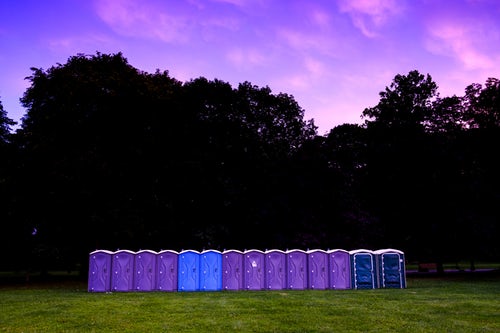
5. The fifth factor which contributes to the amount of water you need to drink is the amount you sweat naturally, during exercise or due to living in a warm environment. The more water you lose through sweat and expiration (heavy breathing with exercise) the more water you will need to drink to replace this. If you are interested in a simple and non-invasive techniques you can use to estimate the amount of water, you lose during exercise and therefore the amount of water you need to drink during exercise to replace this loss go to the end of this post*.
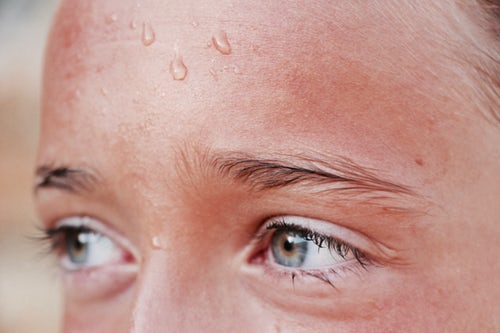
How Much Water Do I Need to Drink a Day?
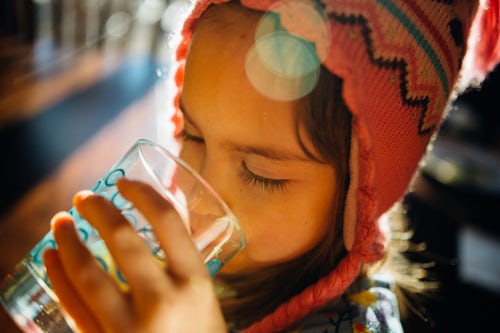
Water Input:
The amount of water we take in and produce in a day comes from two main components the food we eat (700mL) and that released during the process of metabolism (300mL) and is estimated to be around 1L.
Water Output:
On the other side of the equation around 950mL of water is lost through the skin and respiration combined, a further 150mL through faeces and for an adult a minimum of about 500mL daily in urine (for a total daily loss of 1.6L).
The Verdict:
From this we can calculate a 600mL difference between intake and output (output of 1.6L minus input of 1L). Therefore, because water output or loss is 600mL higher than input theoretically we need to drink 600mL of water to make our water intake equal to our water losses and thus create a stable water balance and prevent dehydration.
You might already realise that this 600mL is quite a bit less than the very well-known and widely accepted recommendation to drink 2L (8cups) or more a day and you are right. Even taking into account several variables this recommendation of 2L a day is likely an overestimation for a large percentage of the population. Namely, the exact population this message is targeted towards mildly active, healthy adults living in temperate climates.
Is Drinking More Water Better For Me?

You may also have heard that water makes up over half of your body by weight which highlights that water is vital to life. However, this fact, that we need water to survive, alone does not justify the argument that drinking more water after your requirements are met is therefore in some way better or healthier. Indeed, there are many substances which we need to eat in order to survive but which are harmful if taken in excess to name a few iron, calcium, zinc and copper are all toxic if consumed at too high levels yet without them we would die. In the case of water your body is highly adapted to regulate water intake and output which simply means the more you drink the more urine you will produce therefore while excessive water intake may not be damaging in the same sense as these nutrients any additional intake of water above what your body uses to meet its needs is not imparting any added health benefits.
Take Home Messages
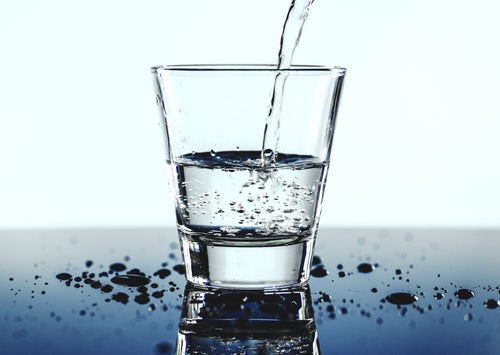
While it is true that drinking water above your daily needs is not likely to pose too much of a health hazard because if your kidneys are functioning healthily the excess water is simply excreted, it is also true that drinking water above your bodies needs has at the same time not shown to be of additional health benefit2. There is no scientific basis to a number of claims made to promote drinking more water above 2L including making your skin beautiful3 or prevention of certain disorders such as bladder and colon cancer4 and drinking 2L of water a day may be excessive for quite a number of people. Therefore, if you are finding it hard to consume the recommended 2L of water per day or are frequently visiting the bathroom in order to reach this arbitrary goal it is likely you are aiming unnecessarily high. Rest assured that if you are providing your body with the water it needs to adequately carry out all the functions water is necessary for you do not need to go beyond this.
If you are still unsure or if you know you would benefit from specific tailored advice get in contact with me and we can work together to ensure you are meeting your hydration needs for optimal health and peak performance or leave a question below.
With my whole heart I hope you found this information useful and inspiring.

Become Great. Live Great.
Bonnie.
*Simple Method to Determine Water Loss During Exercise
A simple technique is to weigh yourself before exercise (go to the bathroom first) then drink as per normal during the exercise but keep a record of the amount of water you drink and then weigh yourself after exercise (again go to the bathroom before weighing yourself). The amount of weight you have lost minus the amount of water you drank during the sport is the amount of water you lost from sweat and in your breath. If you have gained weight, it’s an indication you overhydrated (drank more than your body lost) and if your weight hasn’t changed it means that you self-regulated your hydration well and matched the amount of water you lost with the amount you drank during exercise.
Reference
- Weinberg A and Minaker K. Council of Scientific Affairs, American Medical Association: dehydration evaluation and management in older adults. JAMA 274: 1552–1556, 1995.
- Valtin H. “Drink at least eight glasses of water a day.” Really? Is there scientific evidence for “8 x 8”? Am J Physiol Regul Integr Comp Physiol. 2002; 283: R993-1004.
- Williams S, Krueger N, Davids M, Kraus D, Kerscher M. Effect of fluid intake on skin physiology: distinctive differences between drinking mineral water and tap water. Int J Cosmet Sci. 2007; 29: 131-8.
- Altieri A, La Vecchia C, Negri E. Fluid intake and risk of bladder and other cancers. Eur J Clin Nutr. 2003; 57 (suppl 2): S59-68
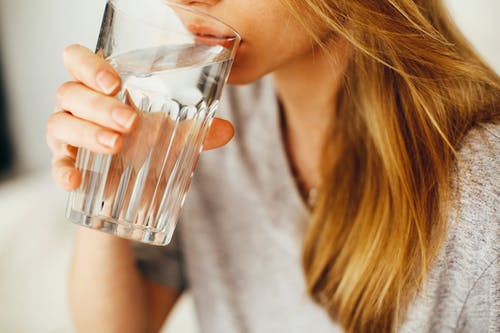



2 thoughts on “How Much Water Should I Drink?”
943464 265003As I web site possessor I believe the content material here is truly fantastic , regards for your efforts. 616872
Thank you so for acknowledging my efforts. I am really happy to hear that you found this post fantastic and I hope to continue to provide you with lots more valuable information.